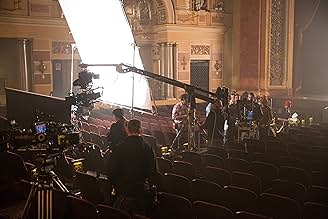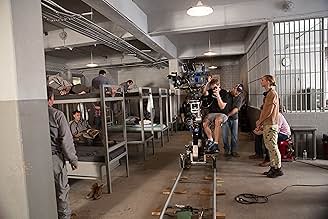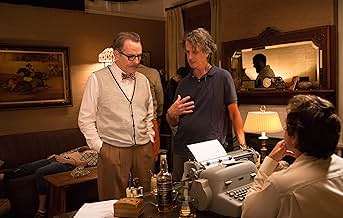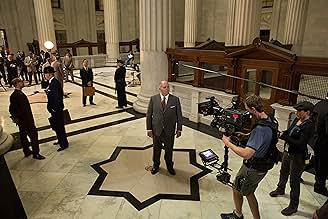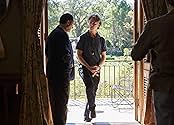VALUTAZIONE IMDb
7,4/10
85.612
LA TUA VALUTAZIONE
Nel 1947, Dalton Trumbo fu il miglior sceneggiatore di Hollywood, fino a quando lui e altri artisti furono incarcerati e inseriti nella lista nera per le loro convinzioni politiche.Nel 1947, Dalton Trumbo fu il miglior sceneggiatore di Hollywood, fino a quando lui e altri artisti furono incarcerati e inseriti nella lista nera per le loro convinzioni politiche.Nel 1947, Dalton Trumbo fu il miglior sceneggiatore di Hollywood, fino a quando lui e altri artisti furono incarcerati e inseriti nella lista nera per le loro convinzioni politiche.
- Regia
- Sceneggiatura
- Star
- Candidato a 1 Oscar
- 8 vittorie e 45 candidature totali
David Maldonado
- Rocco
- (as Dave Maldonado)
Toby Nichols
- Chris Trumbo (age 6-10)
- (as Tobias McDowell Nichols)
Trama
Lo sapevi?
- QuizSteve Martin wrote that early in his career that his girlfriend and her "different" family introduced him to new ideas and intellectual opportunities. Her father was Dalton Trumbo. Martin had never heard of Trumbo.
- BlooperWhen the Oscar is presented for Best Screenplay at the 1954 Awards the presenter says, "And the Oscar goes to..." This phrase was not used by presenters until the 61st Academy Awards in 1989. In the 1950s the presenter would have said, "And the winner is..." when presenting an Oscar.
- Citazioni
Dalton Trumbo: Friends? What friends? Who the hell has the luxury of friends? I've got allies and enemies. There's no room for anything else.
- Curiosità sui creditiAs the credit scroll begins, photos of the real Dalton Trumbo, his family and other people portrayed in the film are shown. These are followed by historical footage of Trumbo giving an interview (from the same one where he acknowledges that he is 'Robert Rich').
- Versioni alternativeThe version of the movie that has been screened on Indian theaters and telecast in India is a PG-13 level cut that has been rated UA by the CBFC.
Recensione in evidenza
All movie fans should recognize the name of Dalton Trumbo. Even if his heyday was a good half-century ago, his actions during one of Hollywood's very darkest periods still have tremendous impact even today. Especially today, for that matter.
Some quick background. You may recall that in World War II, the US and the Soviets were allies but that after the war we became distrustful adversaries. This time was known as the Cold War – since the two countries didn't fight one another – and really ended only in the late 1980s. Prior to the end of WW II, many Americans joined the Communist Party as a way to fight the rise of Fascism in Europe. After the war, current and former members of the Party were looked upon as pariahs of the highest order. Screenwriter Dalton Trumbo (Bryan Cranston) was one of these pariahs. It didn't help that he actively tried to rally technical workers on film sets (grips, lighting and sound technicians) to strike for higher pay. Unionizing was seen as a bad thing, despite the gains it had achieved for American workers earlier in the century.
Trumbo's membership in the Party wasn't a big deal at first, but then gossip columnist Hedda Hopper (Helen Mirren), who wielded an enormous amount of power in Hollywood, took it as a personal affront and used her column (and weekly appearance in newsreels) to denounce Communism in general and Trumbo in particular. Kicking the whole scandal into high gear was a little-known congressional group – the House Un-American Activities Committee. These guys tried to rout out Commies from Hollywood (which it saw as holding a lot of sway over Americans, much more so than today) by calling a group of known or suspected Communists to Washington for sworn testimony. These men were known as the Hollywood Ten. Trumbo was one of them, and he refused to tell the committee the names of anyone else who was or who could be a Communist. He, like his fellow Ten members, was found in contempt. Later, someone not in the group did name Trumbo, and he was put in prison for a full year.
When he got out, no one would hire him (or any of the others in the Ten). Except for King Brothers Studio, which couldn't pay him much. But Trumbo worked fast as both a writer of original stuff and a fixer of existing scripts. The Kings loved him. So much so that the others in the Ten were offered jobs (for no credit, same as Trumbo) working as script doctors. During this time, Trumbo also got work from some friendly sorts in the business by selling them a script but not taking on-screen credit; the credit typically went to a fictitious person, or to a willing accomplice – known as a front. Through this method, Trumbo won two writing Oscars – although no one knew it at the time.
Dalton Trumbo fought for himself, his fellow writers, and for anyone for whom the Bill of Rights holds any meaning. He reasoned that if people could be silenced for political beliefs, then anyone could be silenced for any reason. This is, unfortunately, still true today. And although he didn't receive credit at the time, Trumbo was awarded his Oscars eventually (one posthumously). He's recognized as being one of the very greatest screenwriters the world has ever known. The movie does a terrific job describing Trumbo's struggles – and that of his family: his wife Cleo (Diane Lane) and his three doting children. The toll that his stance took on them was noticeable to everyone except for Trumbo himself.
Cranston turns in what was an Oscar-nominated performance, but his was not the only one of note. Lane is superb as his suffering, strong better half. Elle Fanning, as his eldest daughter, is also a standout, as are John Goodman (as Frank King) and Alan Tudyk (as writer Ian McLellan Hunter). Spellbinding from start to finish, and all screenwriters owe Trumbo a huge debt of gratitude for his long struggle on their behalf.
Some quick background. You may recall that in World War II, the US and the Soviets were allies but that after the war we became distrustful adversaries. This time was known as the Cold War – since the two countries didn't fight one another – and really ended only in the late 1980s. Prior to the end of WW II, many Americans joined the Communist Party as a way to fight the rise of Fascism in Europe. After the war, current and former members of the Party were looked upon as pariahs of the highest order. Screenwriter Dalton Trumbo (Bryan Cranston) was one of these pariahs. It didn't help that he actively tried to rally technical workers on film sets (grips, lighting and sound technicians) to strike for higher pay. Unionizing was seen as a bad thing, despite the gains it had achieved for American workers earlier in the century.
Trumbo's membership in the Party wasn't a big deal at first, but then gossip columnist Hedda Hopper (Helen Mirren), who wielded an enormous amount of power in Hollywood, took it as a personal affront and used her column (and weekly appearance in newsreels) to denounce Communism in general and Trumbo in particular. Kicking the whole scandal into high gear was a little-known congressional group – the House Un-American Activities Committee. These guys tried to rout out Commies from Hollywood (which it saw as holding a lot of sway over Americans, much more so than today) by calling a group of known or suspected Communists to Washington for sworn testimony. These men were known as the Hollywood Ten. Trumbo was one of them, and he refused to tell the committee the names of anyone else who was or who could be a Communist. He, like his fellow Ten members, was found in contempt. Later, someone not in the group did name Trumbo, and he was put in prison for a full year.
When he got out, no one would hire him (or any of the others in the Ten). Except for King Brothers Studio, which couldn't pay him much. But Trumbo worked fast as both a writer of original stuff and a fixer of existing scripts. The Kings loved him. So much so that the others in the Ten were offered jobs (for no credit, same as Trumbo) working as script doctors. During this time, Trumbo also got work from some friendly sorts in the business by selling them a script but not taking on-screen credit; the credit typically went to a fictitious person, or to a willing accomplice – known as a front. Through this method, Trumbo won two writing Oscars – although no one knew it at the time.
Dalton Trumbo fought for himself, his fellow writers, and for anyone for whom the Bill of Rights holds any meaning. He reasoned that if people could be silenced for political beliefs, then anyone could be silenced for any reason. This is, unfortunately, still true today. And although he didn't receive credit at the time, Trumbo was awarded his Oscars eventually (one posthumously). He's recognized as being one of the very greatest screenwriters the world has ever known. The movie does a terrific job describing Trumbo's struggles – and that of his family: his wife Cleo (Diane Lane) and his three doting children. The toll that his stance took on them was noticeable to everyone except for Trumbo himself.
Cranston turns in what was an Oscar-nominated performance, but his was not the only one of note. Lane is superb as his suffering, strong better half. Elle Fanning, as his eldest daughter, is also a standout, as are John Goodman (as Frank King) and Alan Tudyk (as writer Ian McLellan Hunter). Spellbinding from start to finish, and all screenwriters owe Trumbo a huge debt of gratitude for his long struggle on their behalf.
- dfranzen70
- 17 ott 2017
- Permalink
I più visti
Accedi per valutare e creare un elenco di titoli salvati per ottenere consigli personalizzati
Dettagli
Botteghino
- Budget
- 15.000.000 USD (previsto)
- Lordo Stati Uniti e Canada
- 7.857.741 USD
- Fine settimana di apertura Stati Uniti e Canada
- 74.177 USD
- 8 nov 2015
- Lordo in tutto il mondo
- 11.430.025 USD
- Tempo di esecuzione2 ore 4 minuti
- Colore
- Mix di suoni
- Proporzioni
- 1.85 : 1
Contribuisci a questa pagina
Suggerisci una modifica o aggiungi i contenuti mancanti

Divario superiore
What is the streaming release date of L'ultima parola - La vera storia di Dalton Trumbo (2015) in Canada?
Rispondi







